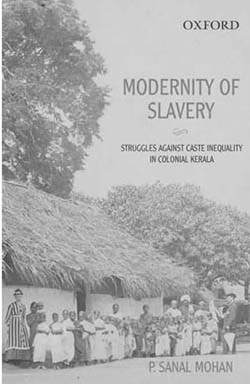As the title suggests, P. Sanal Mohan’s Modernity of Slavery, employs a multidisciplinary approach and marks a significant contribution towards understanding the history of oppression within the story of modernity. By exploring the hitherto neglected histories of slave caste populations in colonial Kerala, he makes a passionate attempt to recover lost voices. Spread across six substantial chapters, this work probes the life-worlds of the oppressed Pulaya and Paraya communities of Travancore-Cochin through Protestant missionary sources. He situates the long forgotten history of Dalits in Kerala within a global context and at the crossroads of history, anthropology and ethnography.
Historians are now increasingly turning to missionary archives that are filled with abundant information on the lives, habits and struggles of the colonized in different parts of the world. While such sources are treated with necessary scepticism, and are firmly located within the structures of colonial power within which they were produced, they may often be the only sources that acknowledge the oppressed as complex characters, particularly in the history of global expansion and colonialism as agents of temporal and spiritual change. The author explores this world of slave castes of Kerala via the London Missionary Society (LMS) and Church Missionary Society (CMS) records, to recover their narratives of suffering in nineteenth and early twentieth century Kerala. These missionary writings throw light upon their conditions of work, family, customs and religion. Sanal Mohan asserts that the dialogue with missionaries played a crucial role in ‘humanising’ slave castes and provided them with new avenues for self-fashioning. The spread of literacy, introduction of a new time-discipline and work ethic, notions of sin and the exchange of ideas through Protestant missionaries, amongst others, allowed slave castes to forge a new social imaginary. This, the author argues, was the reason for the ‘modernity of slavery’.
Mohan critiques the oft-quoted assumption that the abolition of slavery meant the rise of free labour wherein every man and woman was voluntarily ‘free’. He points out, by drawing on the similarities with Atlantic black slavery, that the growth of the modern world occurred precisely on the backs of labouring slaves, and India was no exception. However, the slave castes of Kerala, he argues, imagined a trajectory of modernity for themselves as a result of their dialogues with Protestant missionaries. As the author states, ‘they acquired modern language, new relationships with the sacred and ritual spaces, and engagement with the emergent public sphere’ (p. 34) The repeated assertion of this historical fact of processes of modernity amongst the oppressed makes Sanal Mohan’s work a welcome and challenging addition to the slowly growing historical field that interrogates caste in Indian society. His chapters deal primarily with the overlapping themes of labour, religion and formation of the self.
Continue reading this review

